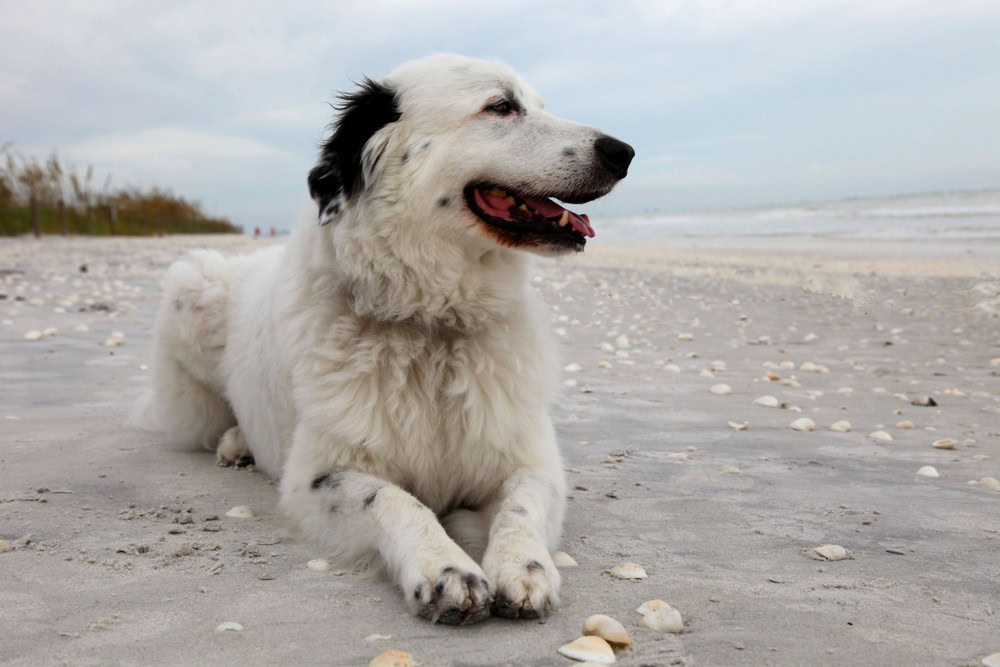How to Make Your Dog Smell Good Naturally: 7 Vet Approved Ways

Updated on
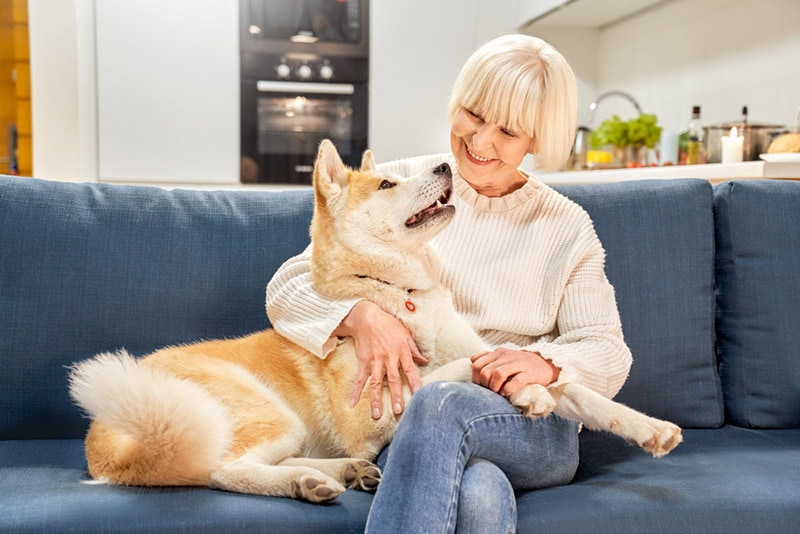
Nobody wants a pungent pup, but keeping your dog smelling fresh can seem tricky. While there are plenty of shampoos, doggy deodorants, and other products on the market, many of them use chemicals and perfumes, which can cause reactions in your dog and you and your family.
Fortunately, if you are looking for a home remedy for a smelly dog, there are lots of natural options. You may even already have some of the required ingredients in your home, and some techniques just require a bit of a change to your schedule.
The 7 Home Remedies for a Smell Dog
1. Bathe Them Regularly
Some dogs do a reasonable job of keeping themselves clean with self-grooming, but even the most fastidious of dogs can smell from time to time. This is especially true if they have been rolling around in mud or swimming in dirty water. Bathe your dog regularly to help keep odors down and ensure they stay clean and fresh. It’s generally recommended that a healthy dog with no skin problems only needs bathing once a month at the most. If bathed too often it can strip the natural oils from your dog’s fur and it may leave them in worse condition than when you started.
When you bathe your dog, make sure you use a natural shampoo formulated for dogs, such as an oatmeal-based product.
Our Recommendations Adding a shampoo and conditioner duo to your pet's grooming routine could be the difference in creating a soft, fluffy coat and hydrated, nourished skin. Heppers Oatmeal Pet Shampoo gently lifts dander, dirt, and excess fur without scrubbing away the natural oils important to your cat's derma health. The Pet Conditioner restores any moisture that may have been washed away and will prevent tangles and static. Both are all natural and formulated to soothe irritated skin.
Hepper Oatmeal Pet Shampoo
Hepper Pet Conditioner
All-natural
Fresh, light scent
Cleans fur and skin
Combats tangles & static
2. Brush Them Regularly
Brushing helps remove dirt, dust, and debris. It also helps spread your dog’s natural oils around its coat so that it looks healthy and smells better. Depending on the breed of your dog and the type and length of coat they have, you should brush them somewhere between two times a week and every day.
Poodles, Akitas, and Huskies are some of the breeds that benefit from daily brushing. Vizslas, Boxers, and Beagles only really need brushing a couple of times a week.
3. Brush Their Teeth Regularly
No matter how clean and tidy your dog is, they can’t brush their teeth, and the mouth is one area of the dog that can start to smell if it does not get regular attention. Start brushing your dog’s teeth regularly when they are a puppy and they will soon get used to the sensation. Brush at least three times a week and ideally every day.
If your dog is resistant to dental brushing, consider getting a finger brush or using flavored dog toothpaste.
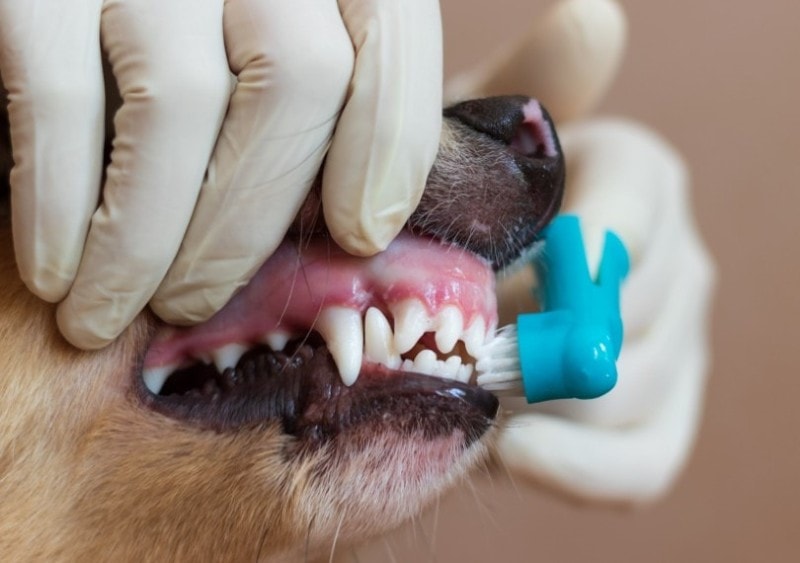
4. Wash Their Dirty Paws
When dogs go out for a walk or to run around the garden, they stand in all sorts of dirt. They can also gather bacteria, which breed and can start to smell. And because the dirt is on the bottom of the paws, you may not even notice that it is dirty. Wash the bottoms of their paws whenever you get back from a walk as this will help potential smells before they are allowed to fester.
High-quality wet wipes can help you keep your dog clean from head to tail. Our Hepper Wash Wipes are infused with natural, moisturizing ingredients that will soothe your dog's skin while effectively removing dirt and grime. These soft, hypoallergenic wipes are made in the USA and safe for dogs and puppies of all breeds.
5. Wash Their Bedding Regularly
It may not be your dog itself that is causing the stink: it could be their bedding. They lay on it all day, licking themselves and transferring debris from their coat onto the bedding. The damp environment caused by the slobber and sweat allows bacteria to multiply and it is this bacteria that can cause really bad smells. And, if your dog has rolled in anything, this will transfer to the bedding, too.
Use a natural washing powder and make sure the bedding is fully dry before you put it back on the bed.
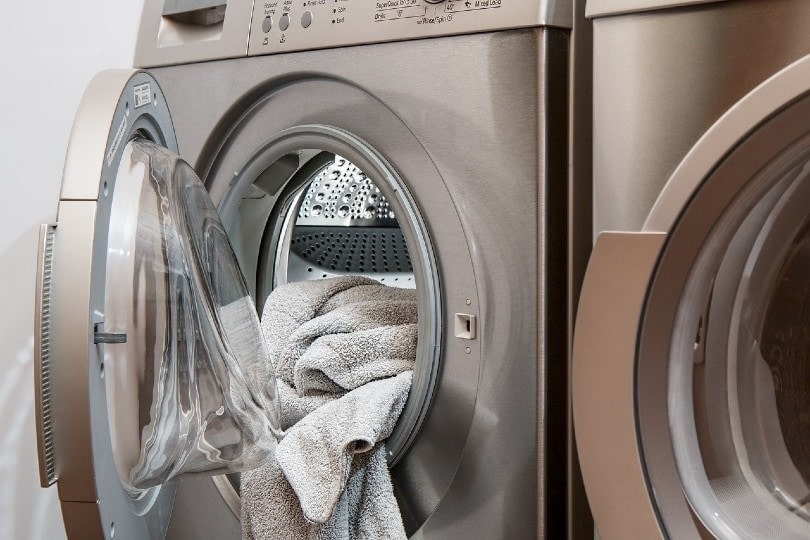
6. Dry Bathe Them with Cornstarch
There are a few ingredients you might have at home that you can try using on your dog. Cornstarch or baking soda can make great dry shampoos. Sprinkle some on their coat and massage it in, avoiding their face. Leave it for around 10-20 minutes, and then gently vacuum or brush it out. These are neutral smelling, which means they neutralize smells rather than replacing them with another. Avoid letting your dog ingest the baking soda or cornstarch, and it’s a good idea to check with your vet before using it, especially if your dog has sensitive skin.
You can also use baking powder on bedding and on other surfaces like carpeted floors and furniture, to help remove dog odor from the rest of the house.
7. Feed Them Good Food
A poor diet can lead to a host of problems with your dog. It can lead to poor digestion which, in turn, means a gaseous dog. It can also contribute to dental problems that can also smell. Dog food doesn’t have to be prohibitively expensive to be decent, but it does need to meet a dog’s nutritional requirements. You can even get some foods that include ingredients designed to reduce odor.
Omega 3 fatty acids, either in the diet or as a supplement, are a natural anti-inflammatory and good for skin health in general.
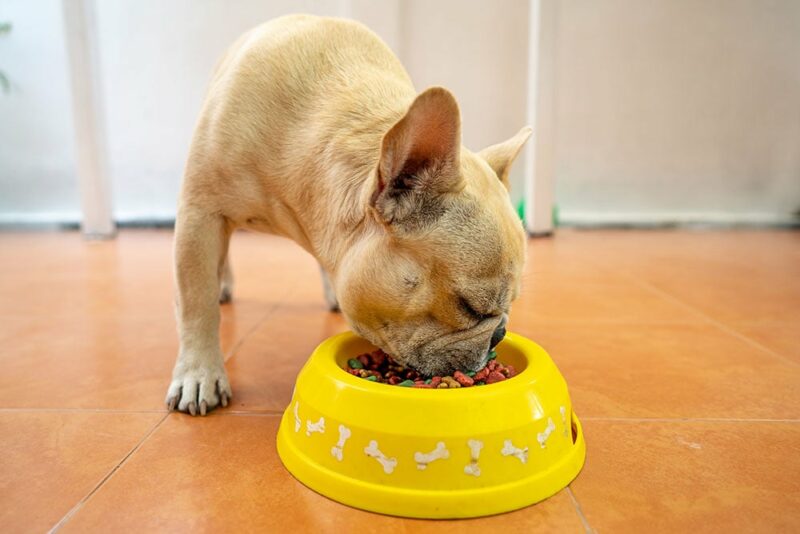
Frequently Asked Questions
Why Does My Dog Stink Even After a Bath?
Bathing a dog can help remove some odors, especially those caused by dirt and grime that has caught in their fur or on their paws. If your dog still smells after a bath, it may mean that you are bathing them too often. This strips the coat of natural oils, which themselves offer protection and help reduce odors. It could even be a sign of illness or infection in your dog or problems with the anal glands.
If you can’t shift the smell, it is worth visiting your vet to get their opinion, especially if your dog is showing other signs of possible illness.
Can I Spray Febreze on My Dog?
Febreze is a fabric deodorizer that is used on carpets and furniture. It is not designed to be sprayed on pets, and it does use chemicals that might cause allergies, sensitivities, and illness in dogs. It should not be sprayed on any animal, including dogs.
Is It OK to Bathe a Dog Every Week?
For dogs with healthy skin, vets usually recommend that you do not bathe a dog more than once a month. Doing so can strip the coat of its natural oils, which leaves the coat looking rougher and prevents it from offering the protection your dog needs.
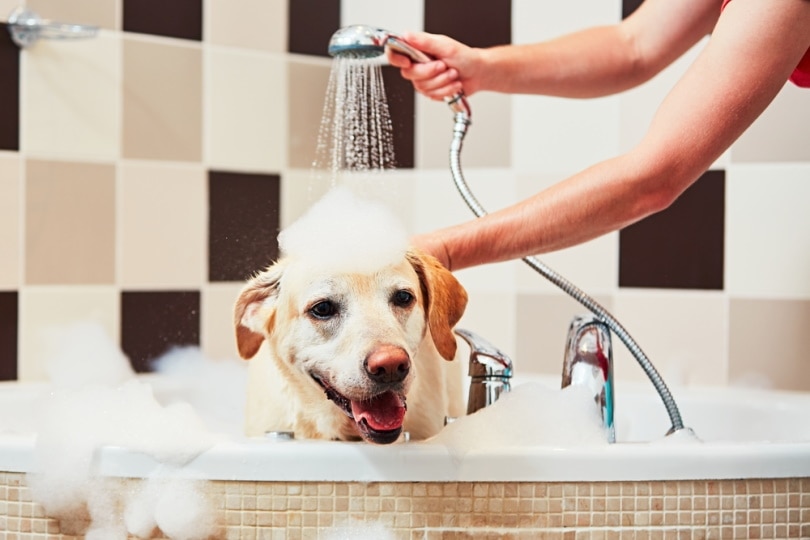
Could There Be a Medical Reason My Dog Smells Bad?
An odorous dog is not usually the result of illness, but certain illnesses may be the cause of the problem. If you’ve tried everything else and your dog does still smell, consider whether they have any other signs of illness. Yeast and bacterial infections can cause odors, and these most often occur on the skin or in the ears. Also, check your dog’s teeth and mouth for any signs of infection. If you do believe your dog has some kind of infection, let a vet check them over to see what is wrong.
Conclusion
Some breeds of dogs, like Bloodhounds, are more likely to smell. In the case of the Bloodhound, it is because they have lots of folds of skin and dirt and bacteria can get caught in those folds. Other breeds like Labradors have a natural dog smell and they are also more likely to roll in the dirt and swim in dirty water. Whatever the breed of your dog, there are lots of home remedies for smelly dogs, and we have covered seven natural methods that should help control dog smells without relying on chemicals and perfumed products to get the job done.
Related Reads:
- Best Dog Deodorants, Colognes & Perfumes – Reviews & Guide
- Ayurveda for Dogs: Does It Work? Our Vet Explains Facts, Risks & FAQ
Featured Image Credit: Viktoriia Hnatiuk, Shutterstock









